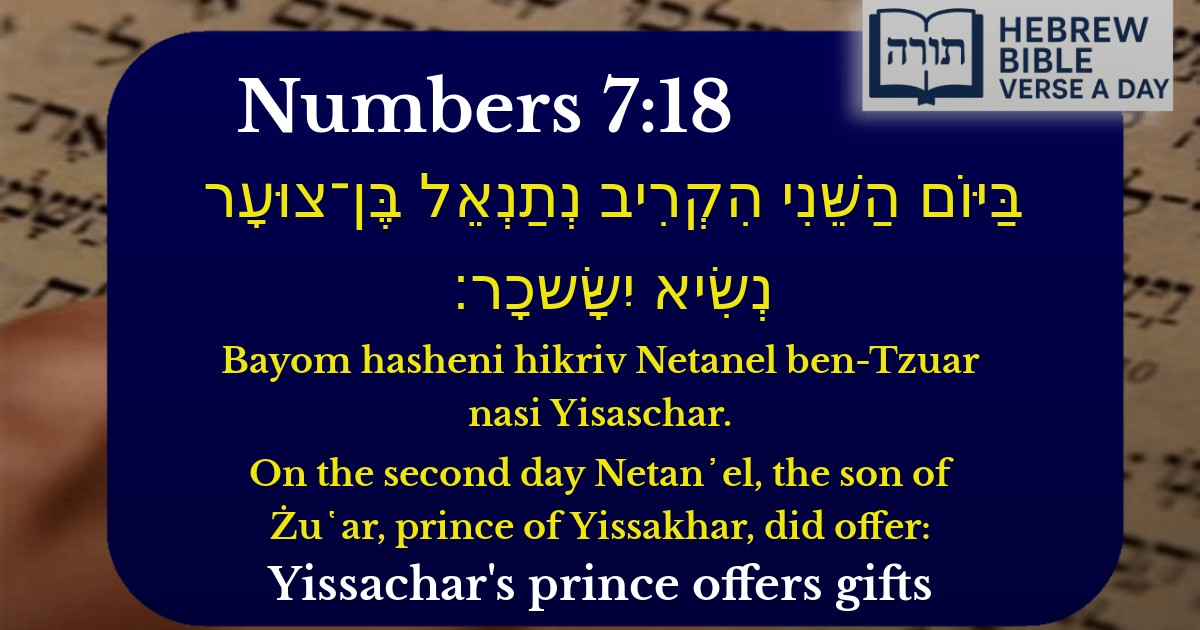Join Our Newsletter To Be Informed When New Videos Are Posted
Join the thousands of fellow Studends who rely on our videos to learn how to read the bible in Hebrew for free!
Hebrew Text
בַּיּוֹם הַשֵּׁנִי הִקְרִיב נְתַנְאֵל בֶּן־צוּעָר נְשִׂיא יִשָּׂשכָר׃
English Translation
On the second day Netan᾽el, the son of Żu῾ar, prince of Yissakhar, did offer:
Transliteration
Bayom hasheni hikriv Netanel ben-Tzuar nasi Yisaschar.
Hebrew Leining Text
בַּיּוֹם֙ הַשֵּׁנִ֔י הִקְרִ֖יב נְתַנְאֵ֣ל בֶּן־צוּעָ֑ר נְשִׂ֖יא יִשָּׂשכָֽר׃
בַּיּוֹם֙ הַשֵּׁנִ֔י הִקְרִ֖יב נְתַנְאֵ֣ל בֶּן־צוּעָ֑ר נְשִׂ֖יא יִשָּׂשכָֽר׃
🎵 Listen to leining
Parasha Commentary
📚 Talmud Citations
This verse is not quoted in the Talmud.


Context in the Torah
The verse (Bamidbar 7:18) describes the offering brought by Netanel ben Tzuar, the prince of the tribe of Yissachar, on the second day of the dedication of the Mishkan. This event follows the twelve consecutive days of offerings brought by the tribal leaders (נשיאים) during the inauguration of the altar.
Netanel ben Tzuar and the Tribe of Yissachar
Rashi (Bamidbar 7:18) notes that Netanel's name reflects his divine connection—"Netan-El" means "given by G-d." The Midrash (Bamidbar Rabbah 13:15) highlights that Yissachar was known for its Torah scholarship, as stated in Divrei Hayamim I (12:33): "And of the children of Yissachar, men who had understanding of the times." This suggests that Netanel, as their leader, embodied wisdom and devotion to Torah study.
The Significance of the Second Day
The order of the tribal offerings follows the arrangement of the encampments around the Mishkan. Yissachar, part of the camp of Yehuda (along with Zevulun), offered on the second day after Yehuda's prince on the first. The Ramban (Bamidbar 7:18) explains that this sequence teaches the importance of unity among the tribes, as each leader brought identical offerings despite their individual distinctions.
The Offering Itself
Yissachar's Role in Torah Leadership
Midrash Tanchuma (Naso 14) elaborates that Yissachar's tribe was particularly devoted to Torah study, supported by Zevulun's material partnership (as per Devarim 33:18). Netanel's offering thus also represents the tribe's commitment to sustaining Torah wisdom, which is the foundation of Israel's spiritual service.